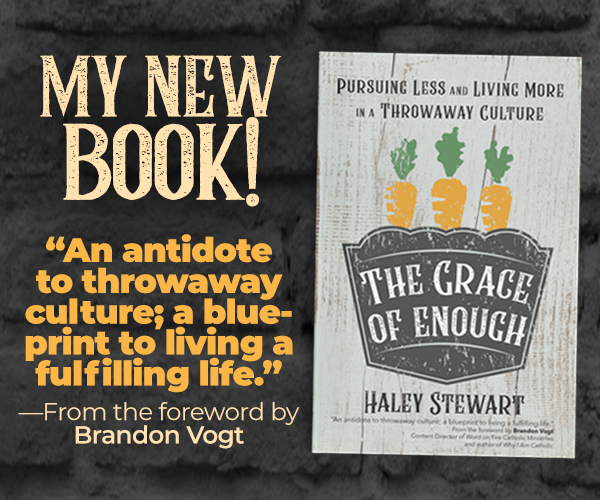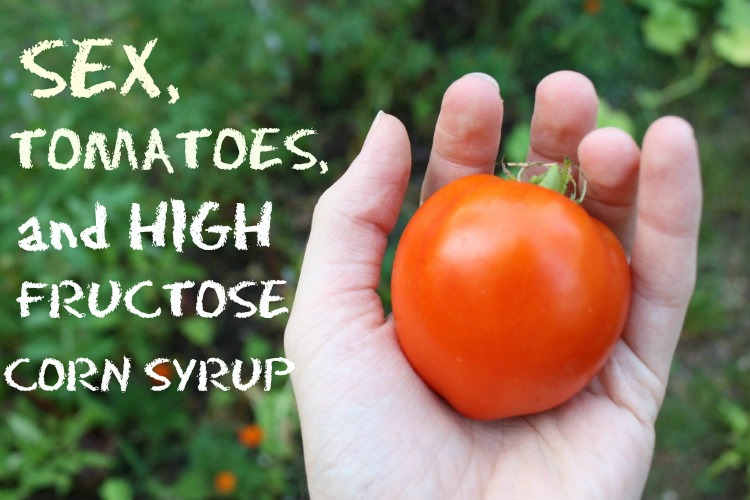Welcome to Carrots! I'm so glad you're here. This is where I share thoughts on liturgical living, faith, parenting, culture, and an extra dose of Jane Austen. You can sign up for my email newsletter here to stay in touch, or look me up on Instagram!
(Guest post by Daniel)
I can no longer eat that little tomato wedge that comes with side salads at restaurants. You know, the little half moon that sits to the right of the iceberg mix with the texture of styrofoam and a taste vaguely reminiscent of watery ketchup. I used to be able to eat them but then I had a real, fresh tomato with soft, meaty flesh and vibrant tomato flavor. Now, I could never go back to the stale and bland tomatoes shipped across the country in midwinter.
But it’s difficult to explain this to our food culture. Sure, people wouldn’t mind a better tasting tomato. But they want to make salsa in January so they want ANY kind of tomato NOW and it better be CHEAP. The idea of waiting or paying more is simply absurd.
This attitude is typical of what I like to call our “high fructose corn syrup food culture.” Here in the US, we plant MILLIONS of acres of corn every year simply so we can boil it down, add some chemicals, and render a cheap sweetener devoid of taste. HFCS is sweet of course, but it lacks the depth of flavor of honey or even ultra-refined table sugar. This makes it perfect to dump into everything from bread to yogurt to mustard to deli meat. And it’s so cheap! What’s the problem?
The problem is, despite the superabundance of food-like products in this country, people are dying. They’re dying from heart disease and suffering from diabetes. Millions of people are obese but aren’t actually getting the nutrients they need. Despite all the land tilled up for agricultural use, so many of our children are malnourished.
Sadly, this paradox of empty excess is not unique to our eating habits. Our culture is also sick because we think of sex in the same way. When the sexual revolution triumphed, we threw off the puritanical chains of our forebears! Everyone can have sex whenever they want with whoever they want! It’s great! It’s cheap! It’s GOOD for you!
…but a deeper look reveals this promise may not have come to fruition. Because we’ve started treating sex the same way we treat high fructose corn syrup. We started to think of the orgasm as the only purpose of sex. This is convenient because orgasms can be gotten so cheaply and easily. But there’s a limit to how much pleasure an orgasm can give. And once it’s over, well… it’s over. So, if you think the orgasm is the only purpose of sex, then you’re going to need another one. And soon. Or you’re going to need to find some way to escalate things in the hope that maybe the next sexual escapade will provide a more lasting pleasure. This is why pornography is becoming increasingly depraved, people are buying ridiculous things like sex swings, and Cosmo advertises “357 New Positions!”; we are not satisfied. We’ve become sick and fat on our constant diet of sex and yet we are still malnourished.
Because there’s supposed to be more! Sex isn’t just about sexual gratification. According to the Church, it is supposed to be both UNITIVE and PROCREATIVE. Neither my wife nor I grew up in the Church and some of these teachings, at first, seemed difficult or even arbitrary. But, as we’ve consented, I think our sex life has become better. Part of this comes from experience as the awkward exploration of our first times has given way to a deep understanding of each other’s body and desires. But another reason is that our “sex life” isn’t just some detachable part of our life like a career or exercise routine. Sex is an integrated part of our life connected to our marriage and continuing commitment to each other. When my wife and I make love (a wonderful expression which hardly describes our culture’s approach to sex), I’m not just trying to satisfy my own sexual desires and I’m not even trying JUST to satisfy hers. I’m uniting with her physically as I’ve already united with her emotionally, mentally, and spiritually. Sex is not an isolated act but, in a way, an extension of the thousands of hours we’ve spent talking and laughing together; trying to take care of each other; and sharing everything from meals to joys and fears. Sex is one of the many ways in which we become “one flesh” and our enjoyment is exponentially greater as a result.
As to the procreative aspect of sex, we aren’t actively trying to get pregnant everytime, of course. But we’re open to the possibility. And part of the richness of that openness is present right in the next room where our children are sleeping. And another part exists in our hearts where we keep our desire to have, God willing, more wonderful children. We aren’t thinking about this when we make love but those blessings are still present with us and deepen the pleasure of sex. The pleasure is compounded because, I am not just making love to a beautiful woman; my beautiful lover is also my selfless wife and the wonderful mother to my children. This is also why our satisfaction is longer lasting. Because we don’t just take pleasure from each other and pull apart. We give ourselves to each other in a way that lasts beyond an orgasm. We contribute to the ever deepening bond tying us together. Sexual pleasure is both heightened by this bond and contributes to it.
All of this is difficult to explain to a high fructose corn syrup culture. “You mean you have to WAIT sometimes? You can’t just have an orgasm whenever?” Well, yes, we do have to wait sometimes. Practicing Natural Family Planning means we have to wait a lot of the time, actually. But I think we’re better off for that. Waiting makes us appreciate the act even more. When I have to wait I begin to crave, not just sexual release but, intimacy with my wife. This doesn’t push us away from each other; it draws us closer. Waiting, if we let it, can strengthen our marriage.
Our culture gives us corn syrup; sex that is easy and cheap, that you can have whenever you want but will ultimately leave you unsatisfied and sick. Soon this sex is like a January tomato, tasteless and stale. The teachings of the Church on sex, by contrast, are meant to give us nourishment and vibrancy, a fuller picture of this beautiful gift from God that will satisfy not only our sexual desires but many of our deeper desires as well.





Beautiful post, Daniel! And what a great analogy. The interesting thing about it is that many people who will be with you 100% on the food issue are the same people that are 100% living the “free sex” lifestyle. Hopefully, some will come across this post and begin to question!
Brilliant post. Thank you for writing it and I hope it reaches many!
so. well. put. thank you!
I wish I had a million ‘friends’ to share this with, Daniel. Thank you for your boldness in speaking the truth! It is so desperately needed in these times. Your precious family is such a lovely example. Thanks for sharing your lives and your faith with us. <3
Excellent! Oh how I pray this reaches the food and sex starved masses! Please submit it to as many magazine editors as possible….as soon as possible. Well done!
This was wonderful. Thank you for sharing!
Aw, that literally had me in tears. Sex is a huge sore spot in my marriage. Thanks for writing, Daniel!
A lovely post.
Made me think of my late husband, and remember happy times. For us, because of our ages, procreation, bedroom fireworks, and inventive gymnastics weren’t part of the picture. That said, we were a married and in love: napping, snuggling, and sleeping together were sacred joys.
Love to you, Amy! I’m so glad I got to meet your John when he was with us.
I just had this type of conversation with a friend the other day – it IS so hard to explain that we choose to put our needs second when everyone’s so used to just popping a pill or running to the grocery store so they can have what they want when they want it.
I am sure that this will turn out to be one of the most popular posts of 2014!
This is a lovely post.
I think the analogy is a good and useful one – food, like sex, is better and more when it takes in the totality of the other thing, instead of seeing it solely as an instrumental good or a means to an end – like satisfaction or pleasure. And accepting things in their totality require a more careful and less immediately gratifying approach to them (growing your own food, only having sex at certain times of the month and only with your spouse), but that’s ultimately more satisfying because it affirms and honoring their worth. Right? Obviously the philosophy and theology is more complicated, but this is more or less how I understand it.
I always wondered about the teachings of the Church on sexuality, though, because I’m not sure why married love is a special case in this regard. Surely it’s beautiful and better to accept the other completely, and not see her or him as primarily an instrument of pleasure or utility, but don’t we do that all the time in other instances? Hired mechanics are means to the ends of repairing our cars, waitresses are means to the end of delivering our food at restaurants, and sometimes a mealy, industrially-grown tomato is all we have around when we’re making a sandwich. We treat all kinds of things as commodities and not as ends in themselves, or as gifts. We understand this, we live this way (perhaps more than we’d like), and as far as I know, it doesn’t violate any Christian theological principles.
I’m all for treating life as a precious gift, but we can’t do it all the time. Why does the Church teach that we need to do it all the time when it comes to sex and sex only?
That should read *honors* their worth, not honoring.
I think it might be key to remember that the Church teaches the inherent dignity of each, individual. Not just the unborn/newly born or the elderly or the married – but every single one of us no matter or age or station.
We are supposed to respect that hired mechanic or waitress as more than a means to an end that gets in to Church teaching on social justice. We’re supposed to remember they are people and therefore not only deserve respect, but safety, security, a living wage, etc.
Thanks for the comment! I think you raise a good point. Here are two responses (one short and one long):
Short answer: I think we all naturally desire more than a relationship of equal exchange (like the waiter/customer you describe). We want to be appreciated for more than the services or goods we can provide. We desire more intimate friendships because that’s how we were designed. Simply, as human beings we want real friendship.
Also, my analogy was inadequate because, with food, our only real goal involves what the food can give us; pleasure to our senses, nutrition for our body, etc. But, with Christian marriage, pleasure is more of a consequence than a goal. Our pleasure is deeper once we give of ourselves but we don’t just give of ourselves to receive pleasure, we do it to be like Christ.
Long answer: I was immediately reminded of Aristotle and his discussion of friendship and love in Nicomachean Ethics. He describes different kinds of “friendships” such as customer/vendor, fellow soldiers, and lifelong friends. With a mechanic, my goal is to get my car fixed and his goal is to make money. We may be friendly and treat each other fairly, but our purpose is still business. With many of my acquaintances and work friendships, there’s a similar goal of utility. They enjoy my company and I enjoy theirs. We may genuinely care about each other but there isn’t much depth to the relationship and our goal isn’t mutual betterment or anything like that. And that’s fine. But everyone, Christian, non-Christian, and even atheist, recognizes that we desire something more than these friendships of utility. This is why we all seek friendships where we actually give of ourselves and desire what’s best for the other person, not just ourselves. This is why we maintain lifetime friendships past the point of convenience and even during times when our friend is not enjoyable to be around. I think this is a reflection of the image of God in us because God desires what’s best for us, even when we’re kind of awful. That concept is so fundamental to us that scripture even uses that to define love, “that while we were still sinners, God loved us and sent his Son to die for us.” So, when we offered God nothing, he still sacrificed for us. The way we give of ourselves pales in comparison, but the reflection is still there.
And, for Catholics, marriage isn’t just another kind of friendship (which is often how it’s treated in secular society). It is a picture of Christ and his bride, the Church. So there’s a mutual self-giving that goes beyond our enjoyment of the the relationship. I think the enjoyment usually follows. But it’s a consequence and not the goal. This is where my food analogy is woefully inadequate to describe the bond of marriage and the physical relationship it draws from.
By the way, as a longtime reader, I am so grateful for your gift of your family’s virtual commonplace book! It’s a glimpse of love and joy in my (single, urban, office worker) life, as I think it must be for many others.
That is so encouraging and kind, Margaret. Thank you!
Daniel, this is so great.
Excellent! You worded it so well! Thank you for sharing.
It reminded me of something else, and I hope you don’t mind if I share. It’s by a member of a different faith (Mormon), but I think it follows the same think you’re trying to portray. Unfortunately, it’s 45 minutes long and an audio instead of video recording, but if you ever have an hour where you don’t have to concentrate too much on what you’re doing, I’d recommend it. I love listening to things like this while I’m washing the dishes and mopping the floors.
I love listening to things like this while I’m washing the dishes and mopping the floors. 
The title is Of Souls, Symbols, and Sacraments. It was given by Jeffrey R Holland, one of the leaders in the Mormon church, to students at Brigham Young University in 1983. I honestly think you would enjoy it.
Happy New Year!
And, after all that, I forgot to include the link: http://www.youtube.com/watch?v=e5PBqxwlfHI
Bravo!
Wow, the title alone caught my eyes, but that content was stellar Daniel…what a POWERFUL analogy for our culture’s view on sex, so true!!! Sharing this gem with folks I know…
This is a wonderful post. I agree with so many of the people who commented in that I am so appreciative you and your family have chosen to be so open to showing others how living your faith looks. I told my husband that you had written a post today and asked if he would like me to read it aloud to him while he was working on something and his reply was, “Oh yes! Please, read it!” (As a side note, I am so glad that my husband and I bond over “Carrots News” and not the annoying pop culture news of our era)
We have had so many conversations together about this very topic and I have to admit, the times that we have bought into the “want it now” thinking (a trap we all can easily fall into), we have been way less fulfilled and much less joyful. We of course did not appreciate each other as much or learn to be as close with each other. In contrast, as we have been trying to observe the opposite lifestyle, we are much happier and are definitely closer than we ever have been. We have begun again to feel open to God, satisfied in life, and growing! Thank you for your post. It is always nice to have someone post a fresh thought on something you are thinking about.
Thanks, Hannah!
So wonderfully put! I can’t wait to share this with as many people as possible!
Excellent post, Daniel!
Tomatoes, corn syrup, sex–seems to me the common denominator is impatience. It reminds me that Tertullian has a brief work, “On Patience,” where he suggests that the real root of the first human sin (and Satan’s, too) is our desire for what we want when we want it. Our way, right away. (Incidentally, in an interesting touch of humility–or maybe he knew that he would get called out–he begins by confessing that his own disposition disqualifies him to write on the subject. He was not a patient guy. Points for honesty!)
Perhaps this is why conversations about rightly ordering sex (and seasonal produce) are such a challenge: these issues cut to the core of our disordered loves. Given our culture’s efforts to make our wish fulfillment ever more efficient, charting a different course isn’t easy.
Awesome post Daniel!
I have to say that your post relating to malnourishment with regards to both sex and food go me thinking right away about had me almost immediately thinking about the “food product” called CHOW that the character Famine hocks in the book Good Omens.
I cannot say how much I admire and respect this blog and the family behind it. If I, a cradle Catholic, were to write a post like this, I always think it would be shrugged at because hey, I haven’t seen the flip-side of life without the Church and my faith. But you two, who have made such a journey to see life through this lens–I know this must truly reach people’s hearts, to hear you speak of love and sex in this way. Thank you for sharing!
Love.This! I simply love this! Comparing sex to a January tomato is spot on! Thank you!
Just a late corn syrup and tomato comment. I find the restaurant tomato particularly distressing in August and September. My children would probably die from embarrassment, but I contemplate bringing in a real one in a baggie for my salad or sandwich.
Last year I ran out of salsa in April. My son, then 16, asked if I would make more. I told him we would have to wait until fall. This year I made twice as much and we still have plenty. I’m thankful my mom taught me how to can.
My understanding of high fructose corn syrup is that it is a byproduct of ethanol production. That’s why we have so much. Industry needed to find something to do with all the excess.
Sue
Hammer meet nail. Spot on.
Wow, that was beautiful and so insightful! Thank you for sharing this!
They say that women probably experienced fewer fertile cycles before the invention of agriculture (as in hunter-gatherer societies). So the patience and the planning that agriculture demands (planting tomatoes at the right time, waiting for the harvest season) are also demanded by the levels of fertility that agriculture produces (natural family planning).
But where people have stopped producing their own food, and where food is available on demand, birth control has also become the norm. So I think the tomato really is more than a metaphor.
Beautifully Said! So rare these days that people really understand and can convey a Catholic perspective on Sex quite so eloquently.
Colin
Thank you so much!!! For writing and sharing this!!! I loved every bit of it. I hope it reaches many, many, many eyes and hearts. Planning to share it soon on Facebook too! Thank you!!
Planning to share it soon on Facebook too! Thank you!!
I love your blog, by the way. God bless you all!
God bless you all!
I’m a new reader and thus far I love the blog!
As for this, what a wonderful post! My husband and I often struggle to explain how sex is different in the Catholic marriage from the way it’s accepted and promoted in mainstream modern culture, particularly when talking with friends who are unmarried and/or not practicing Catholics themselves. Your tomato and HFCS analogies provides such a rich starting point for future conversations, especially because many of these same friends are already on board with saying “no” to GMOs, HFCS, etc. (As an aside, I find no small irony in the observation of those who refuse to buy anything other than organic, hormone-free meats to eat, but then load themselves up with synthetic hormones for the purpose of contraception.)
Awesome post! I am new to this blog and am delighted to read a piece by a husband sharing such understanding and respect for our church’s teaching on sex. Hallelujah! And a little shout out for NFP too? Amazing! I pray that more and more young families are blessed with this understanding and obedience so we may pass it on to our children! Thank you for this… Very refreshing and encouraging!
P.S. Not sure where you guys live but I have two adorable, Catholic toddler boys who will be needing wives in a couple decades… That is, unless they are called to priesthood. I’m just keeping my eye out for Catholic toddler girls… You know, planning ahead. =)
This is beautiful and so well put!
Happened upon your blog via an email from Jeannette of the long hair, horses, and TAC (surnames withheld). Am glad to have found it.
God bless you, dear sir!
This was so beautifully said. I plan on showing this to my (non-Catholic) husband as you’ve put this better than I ever could. x E
Thank you for this blogpost! It is beautifully written! I am sharing with my clients via Facebook.
Bravo! Brilliantly said.
Such a great read! You put this so beautifully!
This is so beautifully written, thank you! This is exactly the article I’ve been wanting to see so that I can show it to my husband, and also to many people that do not speak fluent english. Have you thought about having a spanish translation to you article? I’d love to share this article and I’d love it if it is in spanish of course. Thanks!
This post was spot on! The tomato/HFCS analogy does the trick. I will be sharing this post, as it does a great job at getting us to think, at least with regard to sex, about how things can be so much more rich when they are embedded in a meaningful context instead of being stripped from one.